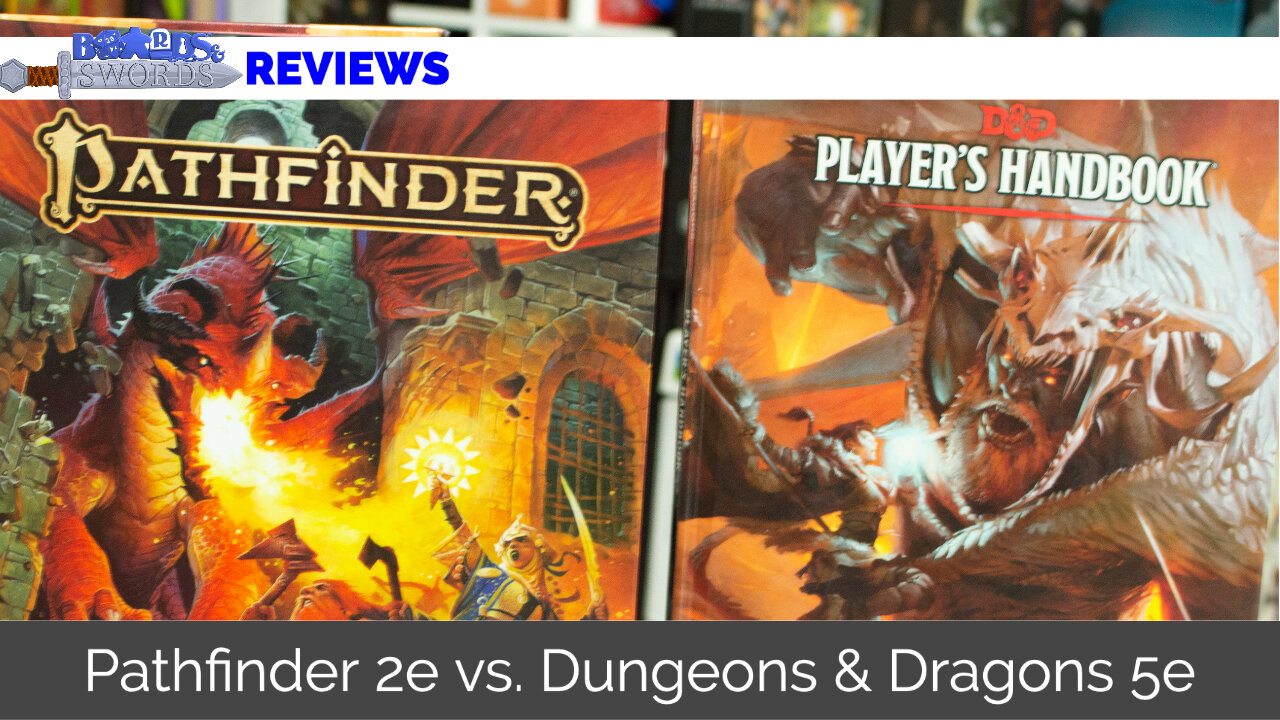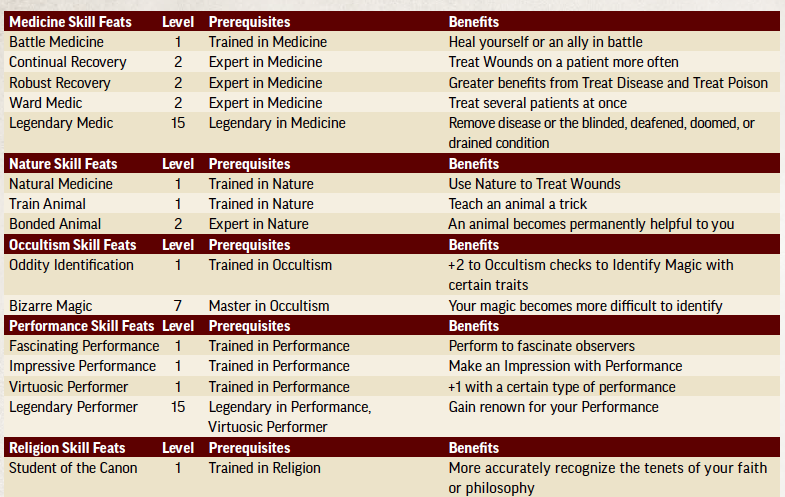Choosing Between Chocolate and Strawberry: Pathfinder 2e vs Dungeons and Dragons 5e
By Chris Renshaw
A couple of weeks ago, I took a look at the Core Rulebook for Pathfinder Second Edition. When I posted that link on the /r/rpg subreddit, a lot of people correctly critiqued that they wanted to see more of my opinions on the system in the review and how the system compares to D&D5e for its fanbase. However, one thing I will state is that the following reasons aren’t why I “like” or “don’t like” a game. I was asked on said reddit thread which one I prefer, to which I said D&D5e. These reasons are the “why” I would play one over the other. As I mentioned in the reddit comments, it’s like choosing chocolate or strawberry ice cream - just because I pick strawberry most of the time doesn’t mean I hate chocolate.
What’s the story?
I’m starting off talking about story because it’s the one place that I feel that Paizo/Pathfinder outshines D&D/Wizards of the Coast. Both companies have a “default” setting that their adventures take place in. For D&D, that’s the Sword Coast/Forgotten Realms. For Pathfinder, that’s the Inner Sea/Golarion.
The problem is that when you look at the types of D&D adventures there are, there is not much variety to them. In fact, a majority of them take place within the same geographical area of the Sword Coast. Most of them fall into the standard trope of delving through various dungeons to fight off various baddies for a number of reasons. The second biggest failing of 5th edition in my eyes is the need to play towards fan favorites and D&D’s history. If you look at all the official adventures that Wizards has put out, almost all of them are based in some way on an adventure in a previous version of D&D:
Tyranny of Dragons - Don’t get me started on this one.
Princes of the Apocalypse - Based on the Temple of Elemental Evil and other incarnations
Out of the Abyss - Might be unique, not sure
Curse of Strahd - Hey! People like Strahd and Ravenloft!
Storm King’s Thunder - Might be unique, not sure
Tales from the Yawning Portal - Literally updated versions of old adventures
Tomb of Annihilation - Basically “what if Tomb of Horrors had a point and didn’t suck?”
Ghosts of Saltmarsh - Old adventure updated to 5e with some new adventures splashed in
Baldur’s Gate: Descent into Avernus - “Hey! People like Baldur’s Gate! And there’s a new game coming out!”
Don’t get me wrong, I’m not saying they just reprint older adventures with new mechanics …..which they have done….but the core of many of these adventures is based on old material. Where’s the new stories? Where’s the adventures that we’ll be talking about to our kids and they’ll be bringing back in future editions since they’ve mined the crap out of everything else? What’s the point of having setting books for Ravnica and Theros if you don’t have main campaigns set in them? You’d have a more diverse adventure, and as a bonus, people that are interested in more background information can pick up the setting books for more info.
Pathfinder, on the other hand, has a story making machine *down*. Unlike D&D, where you *kinda* know when a new story is coming out, each month Paizo has a new adventure or a new piece to an existing adventure ready for you. Not to mention the themes of each adventure are vastly different: in 1e, they teamed up with Chaosium to create a dark cosmic horror adventure and they had another adventure that sounds like it’s Doctor Who in Pathfinder. In 2e, their second adventure series has players RUNNING A CIRCUS. How weird/cool is that?
Options….So Many Options
This one is pretty self-explanatory. D&D5e has scaled back the amount of options available to player characters. Instead of having the bloat of so many source books, each with chapters upon chapters of new feats and spells, Wizards has limited the amount of customization inherent in the system. There’s plenty of backstory options that you can use to vary your character, but in the core book, there’s only so many ways you can build a Dwarf Fighter. Over time, they’ve added Xanathar’s Guide to Everything, which presented a lot more options, along with a couple of new spells in some of the setting and adventure books.
Meanwhile, Pathfinder 2e overwhelms the user in just the core book alone with endless possibilities that you can create your characters. If the first edition is any guide, this will only increase exponentially in the upcoming years as newer and newer sourcebooks are released, each chocked full with more spells, feats, gods, magic items, and more.
For me though, while Pathfinder2e has the edge on the number of options, the fact that D&D5e has limited its options is what has me prefer that system. First of all, D&D is not the only game that I am playing, so I haven’t found myself in a situation where I’m tired of playing the same type of characters over and over again. Secondly, I get simply lost whenever I look at all the options that Pathfinder has. It’s pretty similar to the board game term of “analysis paralysis”, where you have so many options available, you find it hard to pick the one you want. Personally, in board games I prefer games that limit my choices to a handful of options and me pick from those, and that’s what D&D does for me*.
* NOTE THAT I WANT TO MAKE SURE EVERYONE UNDERSTANDS: I’m not saying that Pathfinder is bad for having all these options. This is a personal preference. If you enjoy having all those options, I can totally understand why you like that.
Anyone know a good mechanic around here?
Having clarified that, this next point should be relatively easy to understand: I like D&D5e because it has a simpler ruleset. For instance, if you have a bonus in a situation, you roll advantage (roll 2d20s, take the highest). If you have a penalty, you roll disadvantage (roll 2d20s, take the lowest). In Pathfinder, there are a number of different penalties and bonuses that you can add to your roll depending on the situation. Once again, I’m sure people that love Pathfinder really enjoy those situations. I don’t want to have pages of reference sheets to remember. There are other rules that embody this as well: the critical success/failure rules for Pathfinder are so unnecessarily complex (to me) - I prefer my crit hits as 20s and my crit fails as 1s.
The Rule 0 Argument
If you’ve continued to read up to this point and not headed to reddit/the comments/my other social media to tell me why I’m wrong, then you probably still have the same point as those people: “But Chris, what about Rule 0?”. For those that aren’t aware, “Rule 0” is the notion that is explicitly spelled out in Pathfinder that the rest of us RPG players have just assumed applies to every game: the GM can supersede any rule at the table. Basically, if I don’t like a rule, why don’t I play without it? Honestly, this is an aspect of the Pathfinder 2e rulebook that I forgot to mention in my review. While Pathfinder prevents itself as a big structured system of rules, in reality it's a spectrum. For those that really enjoy the details of those rules, you can run the game 100% by the book. Yet, raise your hand if you have ever played a RPG “by the book” 100% of the time.
I better see no hands raised.
Even with D&D5e, I don’t run the game 100% by the book. In our personal games, we’ve thrown out the “standard” way of rolling initiative, instead adopting the Genesys/FFG Star Wars way of rolling for “slots” and then having the party discuss when certain people need to go first. It makes it a lot more fun for us to play. If you read between the lines of the Pathfinder 2e core rulebook, you can see that the system is built for that same type of approach: use what you want, feel free to ignore the parts you want as long as everyone is on the same page and is having fun.
Got its own problems
Now let’s toss away Pathfinder and just talk about D&D. D&D has its own issues to worry about, although in its case it has less about the game and more about the people/company who make it. Over the years, Wizards of the Coast and its employees have had a *lot* of allegations of foul behavior. I’m not going to go over each and every one of these as there’s tons of information out there and I’m pretty sure I don’t even know a quarter of what’s going on. In the past, many of these allegations made my stomach churn, but I continued to play D&D because that’s what my friends wanted to play and as the dominant roleplaying game on the market right now, that’s mostly what my audience played too. That changed when Orion Black posted about the horrible conditions he experienced while working for Wizards of the Coast...less than a month after the company had expressed a “Black Lives Matter” statement in June of this year. I wasn’t happy after reading the post and in one of my vlogs I spent a moment talking about why I wasn’t up for running D&D anymore (link directly to the segment).
Not playing D&D on a consistent basis anymore means that I have been scouring around looking at lots of other games that I have been missing out on. I spent Gen Con Online this year playing through a couple of new games (to me) that I have had on my shelves for years but never played. But when Strawberry is your favorite ice cream and someone pees in the carton...you don’t continue to eat the ice cream. So I’ve been taking another look at chocolate...I mean Pathfinder. I’m hoping to get some practice GM’ing Pathfinder 2e soon, and with that I’ll see how much of the system I am comfortable with. I might be able to get what I enjoy out of my D20-based fantasy-type RPGs and just toss out a couple of rules that seem to bogg my games down. Maybe I’ll even try and bring advantage/disadvantage into the game while keeping the rest of what makes Pathfinder 2e great (options, action economy, etc.).
What about you? What fantasy RPG do you prefer playing? Is there one that I should be checking out? For those that play Pathfinder: do you play closer to the rules, or do you simplify some of the complexities yourself? Let me know in the comments below, or on Twitter or Facebook.




